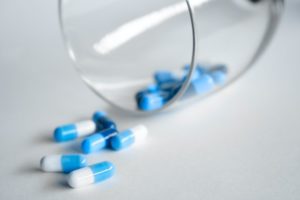 Antibiotics are made from antibacterial substances produced by various species of microorganisms (bacteria, fungi, actinomycetes) that suppress growth of other microorganisms. One of the most well-known discoveries was by Alexander Fleming in 1928 when he discovered penicillin.
Antibiotics are made from antibacterial substances produced by various species of microorganisms (bacteria, fungi, actinomycetes) that suppress growth of other microorganisms. One of the most well-known discoveries was by Alexander Fleming in 1928 when he discovered penicillin.
Antibiotics are an important advancement in therapy because they are used to control or cure serious infections. Antibiotics also treat infectious complications of other treatment modalities such as infections post-surgery or chemotherapy.
Before antibiotics, the human life span was around 47 years. People died mostly from infections such as tuberculosis, pneumonia and gastrointestinal infections. By the end of the 20th century, only lower respiratory infections remained in the global Top 10 causes of death. There was a shift in the pattern of infectious diseases.
However, antibiotic use does come with its own pitfalls. Not all infections require antibiotics (https://www.mmgazette.com/doc-why-wont-you-give-me-antibiotics-dr-hidayatul-radziah-ismawi/), and antibiotic resistance is a serious problem that is impacting our health. Non-judicious prescribing, inappropriate use, and non-compliance to medication are among the causes of antibiotic resistance in the community. Reducing antibiotic resistance is a shared responsibility, both patients and doctors play a role.
 Patients should only take antibiotics when instructed by their doctor. They should take the prescribed dose and finish the course of antibiotics. Antibiotics should never be shared with others.
Patients should only take antibiotics when instructed by their doctor. They should take the prescribed dose and finish the course of antibiotics. Antibiotics should never be shared with others.
As for doctors, they should go through the following checklist before prescribing the antibiotics:
- Is an antimicrobial agent indicated on the basis of clinical findings?
- look for signs and symptoms of bacterial infection in the patient
- Have appropriate clinical specimens been obtained?
- ensure proper specimen collecting techniques and appropriate sample collection
- What are the likely etiologic (causative) agents?
- based on the history, patient demographics, common causative agents
- What measures should be taken to protect individual exposed to the index case to prevent secondary cases?
- contact tracing, prophylaxis, isolation
- Is there clinical evidence (trial) that antimicrobial therapy will confer clinical benefit for the patient?
- Can a specific agent be used instead of the initial empirical agent?
- Is one agent or a combination of agents necessary?
- What is the optimal dose, route of administration, and duration of therapy?
- What specific test required?
- culture and sensitivity, specific media
- What adjunctive measures can be undertaken to eradicate the infection?
- address the root cause, abscess drainage, better nursing care
Once these questions have been answered satisfactorily can the doctor prescribe the appropriate antibiotic to the patient.
Dr Hidayatul Radziah Ismawi is a pharmacologist and lecturer at a medical university in Kuantan, Pahang. She is also the Chief Editor of the Malaysian Medical Gazette.
